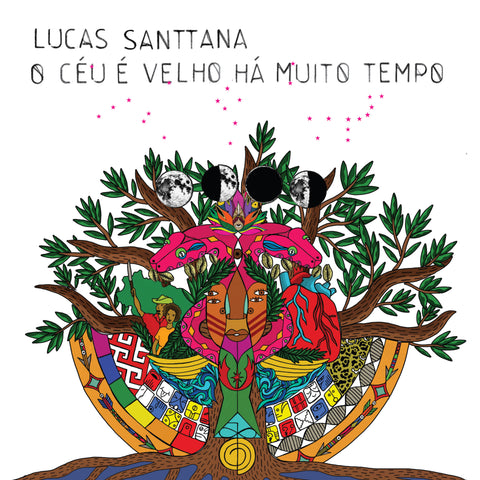All songs written & composed by Lucas Santtana
except 7 (Jorge Drexler), 9 (L. Santtana/L. G. Lopes)
and 10 (L. Santtana/A.Lindsay)
Executive production and A&R - Lucas Santtana
Artwork - Sirc Heart
Graphic design - Element(s)
Lucas Santtana - voice and acoustic guitar
Recorded, mixed and produced by Gilberto Monte
Mastered by Redtraxx
Portal de Ativação uses a piece of "7 way prayer" by Valum Votan
Lucas Santtana was born in 1970 in Salvador de Bahia, black capital of the militant Nordeste region of Brazil. An early acolyte of tropicalism, the radical movement embodied by Gilberto Gil, Tom Zé and Caetano Veloso, which first appeared in Bahia at the end of the 1960s, Santtana has kept its spirit alive and held true to one of its precepts: every vision of modernity involves a break, a rupture. His eighth album, O Céu É Velho Há Muito Tempo (The Sky Has Been Old For A Long time), follows this logic. After the electronic collages which made his name, Santtana has returned to the simplicity of “voz-violão,” - guitar and voice - of the kind we were acclimatised to by Joao Gilberto, the Brazilian hero who created bossa novaby breaking open the arcane mysteries of samba. Gilberto passed away in July 2019. “Releasing this album just after he left us is a powerful symbol for me,” says the warm-hearted Santtana.
On his two previous albums –the chameleon Sobre Noites e Dias (2014) and the multimedia Modo Avião (2017) –Lucas Santtana used sampled sounds, literary extracts (featuring, for example, the voice of Fanny Ardant), noises and impromptu conversations recorded at the door of an aeroplane. The earlier O deus que devasta mas também cura(2012) included samples of Beethoven and Debussy.
This time round, the watchword is sobriety. “On the one hand, from a personal point of view, I had reached the end of that kind of sonic architecture. I wanted to move away from it and, as you do after the end of a happy marriage, leave everything behind, strike out with just one suitcase and keep things simple. What’s more, politically we’re in an era in which everybody is shouting very loud and nobody wants to listen to anybody else, so I thought it was time to speak very softly into people’s ears.” So the Bahian singer-songwriter sought out the points at which the intimate intersects with the political and the social, both of which have been deteriorating in Brazil ever since the election of the far-right populist president Jair Bolsonaro at the end of 2018.
Lucas Santtana regards the troubles of the world with a mixture of grace and pessimism: “The world is going through dark times right now. The far-right and its reactionary ideas are gaining ground everywhere. Brazil hasn’t been spared. A government of militia-men has come to power in dubious circumstances, aided by all the fake-news, especially on WhatsApp. It’s been attacking human rights with violence and censure. It has promoted a culture of death by allowing the use of poisonous agro-chemicals that are banned elsewhere, by making it legal for almost anyone to bear arms, by annexing indigenous lands in Amazonia in order to destroy the rainforest and boost the profits of gold-panhandlers and mining companies. I just can’t understand this force of destruction.”
According to Santtana, the obscurantism of our times promotes “introspection”anda slow slide into internecine conflicts that torment us all. From all this hardness and darkness, a pacific album has emerged, created by Santtana alone, with occasional reinforcements drawn from a radical young-guard of artists that includes Jaloo, Linn da Quebrada and Duda Beat, and from Juçara Marçal from the new jazz band Metá Metá.
The album opens with ‘Portal De Ativação’(Activation Portal) –a song with nor destino flavours (“from xote, baiao, forró to samba de Bahia etc, it’s only natural, it’s my heritage”) that invites the listener to react and take a clear position: Who wants to speak? Raise a hand / Who wants to listen? Raise a hand / Who wants to demonstrate? Well get up on your feet / Who wants to understand?
To Brazil’s vivid melting pot of African cultures, Lucas Santtana adds the shamanism of the Americas, quoting from The Prayer of Seven Directions, an invocation conceived by the new age artist Valum Votan (José Argüilles 1939-2011) which references the Mayan calendar and its mystical cosmology. Elsewhere, his lyrics confront the brutality of persecution in ‘Ninguém solta a mão de ninguém’ (Hold On Tight to Each Other’s Hands) and the lies of the current political system in ‘Um professor está falando com você’ (A Teacher Speaks) : "Justice that lies, police that kill, the church that extorts."
Brasil Patriota’ underscores the perversity of the country’s post-colonial elites by subverting the Brazilian national anthem and mixing parts of it with extracts from The Cosmic Serpent by French anthropologist Jeremy Narby. Santtana imagines an apocalyptic settling of scores as nature avenges itself. “The album proceeds by circumvolution. The songs connect with each other, a word in one song crops up in another, they’re embraced. It’s a world in itself.”
Lucas Santtana is the embodiment of a cultivated and creative Brazil. At the end of the 1990s, the country’s major record labels, victims of mass music piracy, deserted the field of MPB (Musica Popular Brasileira), in other words home-grown pop, however rocking. An independent generation emerged as a result, comprising “sons of”, such as Moreno Veloso the son of Caetano; or remarkable beings such as Rodrigo Amarante; or intellectuals and urban bands such as Metá Metá; or the American-Brazilian Arto Lindsay and the electro singer Céu. “Very varied creative visions, people who, like me, work on textures. What I like doing is clothing music, like a couturier, using various types of cloth and different colours.”
Nephew of Tom Zé and son of the legendary Tropicalist producer Robert Sant’Ana, multi-instrumentalist Lucas Santtana was called upon by his elders, Caetano Veloso and Gilberto Gil,to take part in the making of the album Tropicalia 2, in 1993. He’s on there next to the electro-rock revolutionary Chico Science and his band Naçao Zumbi. Santtana released his debut album Eletro bem Dodô in 2000 on the independent label Natasha Records. He went on to compose music for various MPB stars including Fernanda Abreu, Marisa Monte and Daniela Mercury. In2011, Santtana reached the shores of Europe, via England and the Mais Um Disco label. Thanks to them, the doors of the BBC opened up to him, leading to appearances on Gilles Petersons’ Worldwide radio programme. In 2014, he joined the stable of the innovative French label Nø Førmat.
Lucas believes in the power of love, as a bastion against segregation in the song ‘Meu primeiro amor’ (My First Love) and as an antidote to the arbitrariness of daily life in‘O melhor háde chagar’ (The Best Is Yet To Come).‘Everything passes, everything changes, often for the worse‘ is the core sentiment of ‘Seu pai’ (Your Father), a double-edged blues co-written with Arto Lindsay: Your father was a bandit, but here you are. The profound distress of modern societies, the absurd inversion of values and constants –a justice system that lies, a police force that kills, the bandit who is an artist, the cloud that weighs heavy, the hammock that tires you out –all go to prove that nothing resists the Lavoisier formula*, or so claims the song ‘Tudo se transforma’ (Everything IsTransformed), composed by the Uruguayan Jorge Dexler. In contrast, ‘Não vamos nos desgrudar nunca mais’ (We’ll never be separated from each ever again) and ‘O Bem Major’ (The Good Major) evoke one of the most powerful forms of resistance in these dark times, namely love, of the kind that unites lovers and friends.
Lucas Santtana, musician, philosopher, Francophile, has delivered a record that is free, aerated, poetic. Because “Even though our times are dark, they will pass. Everything is cyclical. Hence the name of the record: The Sky Has Been Old For a Long Time.”
Véronique Mortaigne. (Translated from the French by Andy Morgan).
*Antoine Lavoisier, the 18th century French natural philosopher and chemist, stated that in a chemical reaction “nothing is lost, nothing is created, everything is transformed.”
Summer tour 2021
26.06.2021 VIENNE (FR) Jazz à Vienne
30.06.2021 PARIS (FR) New Morning
12.07.2021 ARLES (FR) Les Suds à Arles
15.07.2021 NARBONNE (FR) La Tempora
21.07.2021 BORDEAUX (FR) Les Inédits
23.07.2021 CHANAC (FR) Détours du monde
30.07.2021 FLOREFFE (BE) Esperanzah TBC
01.08.2021 SETE (FR) Fiesta Sete
10.08.2021 NANTES (FR) Aux Heures d’été
18.08.2021 NOTRE DAME DES MONTS (85) La Déferlante
22.08.2021 VALOGNES (FR) Les Traversees De Tatihou
28.08.2021 CHOMERAC (FR) Festival Soir Guitares



